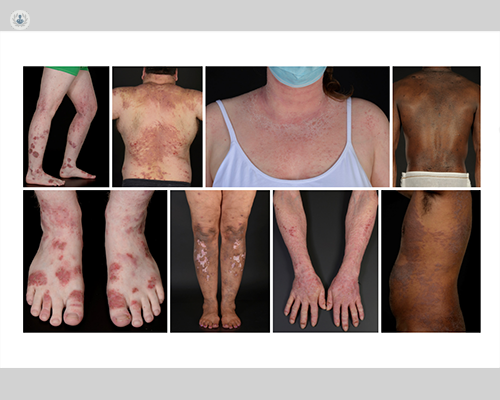How can eczema be managed?
Written in association with:Eczema, also known as atopic dermatitis, is a chronic skin condition characterised by inflamed, itchy, and dry skin. It affects people of all ages but is particularly common in children. The exact cause of eczema is not fully understood, but it is believed to result from a combination of genetic and environmental factors. Eczema can significantly impact the quality of life, especially if not managed properly.

Causes and risk factors
The development of eczema is related to an impaired skin barrier and is often associated with an overactive immune response to irritants. If this remains uncontrolled, then it can lead to allergic sensitisation.
Genetic predisposition plays a crucial role; individuals with a family history of eczema, asthma, or hay fever are more likely to develop the condition. Environmental factors such as pollen, pet dander, certain foods, harsh soaps, and stress can trigger or exacerbate eczema symptoms but are usually not the underlying cause.
Symptoms of eczema
Eczema is primarily characterised by red, inflamed patches of skin that can be intensely itchy. The affected areas may become dry, scaly, and even cracked, leading to discomfort and potential secondary infections caused by bacteria.
In severe cases, the skin can blister and weep, further complicating the condition. Eczema commonly appears on the hands, face, neck, and the insides of the elbows and knees, though it can occur anywhere on the body. The symptoms often vary in severity and can flare up periodically.
Managing and treating eczema
While there is no cure for eczema, it can be effectively managed with proper treatment and lifestyle changes. Moisturising regularly is essential to keep the skin hydrated, reduce dryness and ensure a protective barrier. Topical corticosteroids are commonly prescribed to reduce inflammation and itching during flare-ups an used correctly, in accordance with medical advice, there are usually no significant side effects, although this often a concern of parents.
Identifying and avoiding triggers, such as certain foods or stress, can help prevent exacerbations. In some cases, doctors may recommend antihistamines or oral immunosuppressants for severe eczema.
Living with eczema
Managing eczema requires a proactive approach. Regular skincare routines, avoiding known triggers, appropriate management of flares, and seeking medical advice when necessary are key to minimising the impact of this condition. With proper care, individuals with eczema can lead healthy and comfortable lives despite the challenges posed by the condition.


